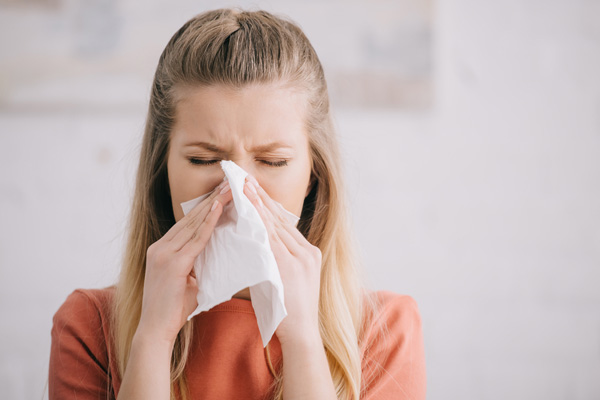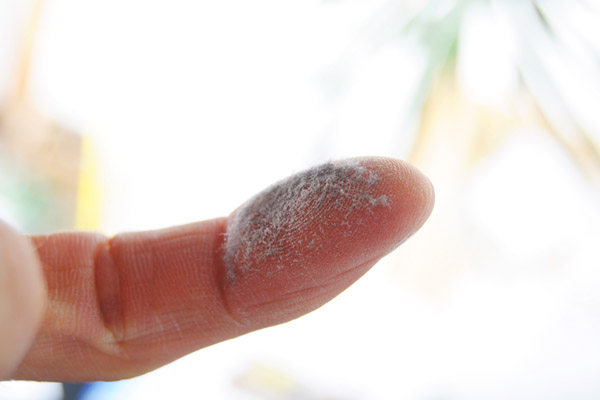Contents

While many individuals immediately associate air pollution with the vivid imagery of thick smog and billowing black smoke, it’s crucial to acknowledge that pollution can manifest in more subtle forms. In reality, numerous indoor air pollutants consist of minuscule, imperceptible particles. These unseen contaminants pervade our surroundings. Therefore, it remains imperative for homeowners not to overlook the upkeep of their indoor air quality.
To address this pervasive concern effectively, homeowners have access to practical solutions, including portable and whole-home air filtration systems. Each of these alternatives possesses its distinct set of advantages and limitations. Let’s delve deeper into the intricacies to gain a comprehensive understanding of portable vs whole home air filtration systems.
The Difference Between a Portable & Whole Home Air Filtration System
The pandemic heightened our awareness of the critical importance of clean air. We’ve become more conscious of the invisible threats that surround us. Taking proactive steps, such as installing an air filter in your home, is a prudent measure to prevent future issues. In this discussion, we delve into two of the most popular types of air filtration products (portable vs whole home air filtration). We cover how they operate, the benefits of breathing clean air, and key insights derived from this valuable information.
The Benefits of Clean Air In Your Home
Let’s explore the advantages of having clean and healthy air in your home.
Reduced Disease Risk
Airborne pathogens can enter our bodies through the air we breathe, posing a significant health threat. Viruses and bacteria are especially dangerous. However, advanced air filters can effectively prevent the circulation of microscopic particles in your home. This provides peace of mind and safeguards the health of vulnerable family members, including children, the elderly, and individuals with health concerns. Additionally, it can help you avoid the financial burden of costly hospital bills.
Allergy Management

Airborne particles can trigger allergies, especially in individuals with heightened sensitivities. Common allergens such as pollen, dust mites, pet dander, and mold spores can enter our homes by latching onto clothes, shoes, or through gaps and cracks. Allergic reactions often manifest as a runny nose, fatigue, watery eyes, sore throat, and nasal congestion. Installing an air filter can lead to improved well-being and productivity by reducing allergen exposure.
Odor Elimination
A pleasant-smelling home is a must, as we can’t simply turn off our sense of smell. Clean, fresh air is essential for our well-being. If your home is plagued by persistent foul odors, it’s crucial to tackle their sources directly. Use non-toxic cleaning solutions to address dirty areas and eliminate bacteria. Additionally, air filtration systems can capture offensive particles in the air, leaving your home smelling clean and fresh.
Minimized Surface Dust

Not all airborne dust particles are inhaled; some settle on surfaces like tables, countertops, sofas, desks, hard floors, and carpets. This accumulation is not only unsightly but also requires frequent cleaning. Disturbing these settled particles can reintroduce them into the air, causing irritation. Air filtration systems effectively purify the air, reducing the circulation of dust indoors. As a result, surface dust build-up is minimized, alleviating the need for constant cleaning.
Portable Vs Whole Home Air Filtration: What To Consider
Keep reading to explore the differences between portable vs whole home air filtration.
Understanding Portable Air Filtration Systems
A portable air filter is a compact and lightweight device that you can easily move from room to room. It offers the convenience of following you wherever you go within your home. However, it’s essential to keep in mind that portable units have a limited filtration capacity, so it’s important to set realistic expectations. They are effective within a specific square footage.
The best portable air filters are equipped with high-quality HEPA filters, capable of capturing at least 99.97% of airborne particles larger than 0.3 microns. This level of efficiency is remarkable, considering that human hair has a diameter of 50 microns, highlighting the effectiveness of these systems.
Understanding Whole-Home Air Filtration Systems

In contrast, whole-home air filtration systems are designed to cover your entire home, as the name suggests. They are significantly larger than portable units and are fixed in position. A central unit processes the air from the return ducts, typically working in conjunction with your existing HVAC system to trap pollutants that pass through the standard filters.
Whole-home filters offer up to 10 times the surface area of regular HVAC filters, providing enhanced protection. In addition to the physical filtration barrier, you can also install ultraviolet lights that can effectively eliminate pathogens upon contact. Whole-home air filtration systems are a superior alternative to portable units due to their higher effectiveness in trapping pollutants.
How Whole-House Air Purifiers Operate
Whole-house air purifiers come in three main designs, each with its unique installation method:
- Filter-Based Units: These are placed at air intake points, ensuring that the air entering your home is filtered before distribution.
- Duct-Mounted Systems: Installed along the duct paths, these units are positioned either before or after the air handler in a central HVAC system.
- Standalone Systems: Typically found in attics, standalone units operate independently with intake and exhaust paths installed throughout the home.
Cons Of Portable Room Purifiers
Below are some of the disadvantages of using portable air filtration systems:
When considering the purchase of portable purifiers, it’s essential to think carefully about your coverage needs. While these units may be more budget-friendly, they are notably less capable than whole-house systems, making the latter a more sensible choice for comprehensive family protection.
While it’s possible to cover an entire home with multiple portable units, this strategy can quickly become costly. In many cases, the total expenditure may match or even exceed the cost of a whole-home filter, offering fewer financial savings.
Depending on the filtration method used, portable room purifiers may emit gases that can harm the ozone layer. To avoid unintentional contributions to environmental problems, it’s crucial to check the unit’s specifications.
Unlike whole-home filters that can absorb odor-causing particles within the ducts, portable units lack this ability. This means that unpleasant odors can reach your living spaces before the small filter has a chance to effectively reduce them.
Conclusion Of Portable vs Whole Home Air Filtration
Clean air is essential for our health and overall well-being. To safeguard your family from diseases and allergies, investing in a reliable air filtration system is crucial. However, it’s important to know the difference between portable vs whole home air filtration. While whole-home air filters offer superior effectiveness compared to portable units, it’s essential to enlist professional installers to ensure optimal performance.
Whole-House Air Filter FAQs

- What is a whole-house air filter, and how does it work to improve indoor air quality? A whole-house air filter is a system installed in your HVAC system that filters and cleans the air throughout your entire home. It works by capturing and removing airborne contaminants as air circulates through the system.
- What types of contaminants can whole-house air filters effectively remove from the air? Whole-house air filters can effectively remove a wide range of contaminants, including dust, pollen, pet dander, mold spores, smoke, and even some bacteria and viruses.
- How do I choose the right whole-house air filter for my home’s specific needs? To choose the right whole-house air filter, consider factors such as your home’s size, the types of contaminants you want to address, and the filter’s MERV rating. Consulting with a professional can help you make an informed choice.
- Are whole-house air filters easy to maintain, and how often do they require servicing? Whole-house air filters are relatively low-maintenance. Regular filter replacement is typically required, and the frequency depends on the filter type. Basic maintenance involves changing the filter every 3 to 12 months.
- What are the key advantages of installing a whole-house air filter system in my home? Installing a whole-house air filter system can lead to improved indoor air quality, reduced allergens, fresher air, and a healthier living environment for you and your family.
Contact Wilcox Energy for Comprehensive HVAC Services
Wilcox Energy provides top-tier heating and cooling solutions across the Southern shoreline of Connecticut. Our team consists of highly skilled, professionally certified technicians adept in delivering exceptional HVAC services, including tune-ups, repairs, installations, and replacements. Each technician brings expertise and experience, ensuring your HVAC system receives the best care.
At Wilcox Energy, we pride ourselves on offering the region’s most competitive prices for heating and cooling services. Our maintenance services can enhance your comfort, boost energy efficiency, and reduce heating and cooling expenses. Whether you require an urgent HVAC repair or are considering a system replacement, our team can guide you to the ideal solution that aligns with your budget. We stand behind our work with a solid satisfaction guarantee. To schedule a service appointment or receive a free, in-home estimate, contact Wilcox Energy today.
For more information about our heating oil deliveries or HVAC services, be sure to contact Wilcox Energy. You can click here to contact us or call us at (860) 399-6218. Call now! Click the link to view our service area.

Related Articles:
